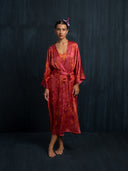Buy 3 items get 15% OFF
Our Journey to Build a Sustainable FashionSustainable fashion goals at RIMMBA in Bali, are deeply rooted in Regenerative Economy Principles. Our commitments — social, environmental and economic — aim to have a positive impact. We support community well-being, use resources thoughtfully, and protect the planet's health, so future generations inherit a healthier world. Ultimately, this is how we approach sustainable fashion in Bali: we make choices that create value at every step of our business. RIMMBA's Values: |

Karunia hand-picking plants to be used for natural dyes. |
1. RIMMBA's Brand Code of Ethics for our Workers and Partners
|

Karunia and the team, in the studio's garden |
3. Lifecycle & Zero-Waste PracticeRIMMBA offers an alternative to fast fashion. We design garments to be timeless and cherished for many years. Therefore, we choose durable, sustainable, and biodegradable fabrics and use careful construction so pieces endure both wear and time. Textile waste is a global crisis — an estimated 92 million tons of textile waste are created each year, and only about 12% is recycled. This waste pollutes ecosystems and communities. At RIMMBA, we reduce waste through mindful design and creative reuse. |

|

|
|
Pre-loved or surplus clothing should never end up in landfill. Our pieces are crafted from renewable fabrics and built to last. We repair, re-dye, and repurpose items so they remain loved and useful. How do we do this? RIMMBA repairs dresses, accepts pieces for redyeing, and repurposes cut-offs. We also combine fabric scraps (linen, cotton, silk) to create new textiles and then over-dye them — for example, indigo over dyeing raw scrap panels creates new material that becomes the base for accessories and smaller clothings. |

|
|
Our metrics: RIMMBA eliminates nearly 100% of fabric waste by using about 98% of textiles through careful pattern planning and creative reuse. We also create smaller garments and accessories — halter tops, crop tops, and silk scrunchies — from offcuts, thereby maximizing resource use. |

|

|
4. RIMMBA’s Commitment to a Non-Toxic EnvironmentWe use botanical dyes and 100% natural fabrics as a cornerstone of our non-toxic approach. RIMMBA sources local botanics and collaborates with dye houses in remote communities — for example, a dye house in North Bali and a recent community project in East Bali. |

|
|
We use certified organic cotton, traceable linen and mulberry silk. Our dyes, bio-mordants and salt mordants are all chosen to be natural and non-toxic; even our threads are selected for biodegradability so finished garments can return safely to the earth.
|

|

|
|
By sourcing botanicals locally, we reduce reliance on synthetic dyes that harm waterways. Moreover, we use bio-mordants and refined techniques to improve dye fixation, reduce water use, and extend the life of color in our garments. |
5. RIMMBA Water Re-UseBali experiences water scarcity in many areas, so treating water as precious is a priority for us. Our small-scale, made-to-order model allows us to dye in small batches, on an as-needed basis. Because we do not use toxic chemicals, we can reuse wastewater safely in our gardens. Also, we consult water management experts as we design regenerative systems. As we scale, we plan to build a constructed wetland / wastewater garden, in order to treat and reuse process water responsibly. |

|
6. RIMMBA’s Journey Toward a Traceable Supply ChainRIMMBA garments are made from cotton, silk and linen — all natural fibers. We do not use petrochemical synthetics or semi-synthetic blends. Our supply chain currently follows these stages:
We are actively seeking certified regenerative textiles directly from producers. Our current fibers include:
|

|
|
We believe regenerative agriculture is the future of sustainable fashion, and we are committed to playing an active role in advancing standards and sourcing. Several leading brands are exploring regenerative textiles; as certified regenerative materials become available, we will prioritize these sources so our garments both delight and contribute to ecological health.
|

|
7. Carbon FootprintAs a small-scale maker, our current energy footprint is modest. We have established an energy baseline for atelier electricity and water pumping, and we track it over time. This way we ensure that RIMMBA complies to sustainable fashion practices in Bali.
Additionally, we continue to support Jiwa Garden and other partners who promote regenerative agriculture and sustainable community practice. |
8. Our Packaging and TagsWe choose organic cotton bags, recycled paper tags, low-impact dyes and natural plant twine to minimize packaging waste and ensure recyclability and biodegradability. |

|

|
9. Educating to Inspire Change
|
10. RIMMBA’s Policy on AnimalsAs part of its sustainable fashion practices in Bali, RIMMBA uses mulberry silk, a sericulture-based fabric. (See our pages on why we choose Mulberry Silk and on Ahimsa / vegan silk.) We do not use fur, leather, skins, or shells, nor do we conduct animal testing. In future we may consider ethically sourced wool where it meets our standards for sustainability and dyeability. |



















